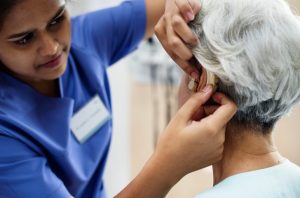
The study looked at medical records of 433 patients aged 80 to 106 to determine a possible link between hearing loss and CVD risk factors.
Hearing loss information was collected using audiograms along with word recognition scores (WRS). CVD was explored in all forms and risk factors including coronary artery disease, diabetes, history of cerebrovascular accident, hypertension, and smoking. Researchers also determined the rate of hearing loss.
Of the group, 359 patients had sensorineural hearing loss while the remaining had mixed hearing loss. Hypertension was the most common condition among patients and cerebrovascular accidents were least common.
Prevalence of at least one cardiovascular morbidity was associated with elevated mean low-frequency pure-tone average (LFPTA).
At least one disease was associated with accelerated hearing loss, and patients with a form of CVD experienced a greater decline in LFPTA. Coronary artery disease had the greatest association with audiometric thresholds, poor WRS, and poor hearing at all frequencies. Lastly, hearing loss was seen more in men than women.
The authors concluded, “In the older old, CVD was associated with low-frequency hearing loss, increasing not only hearing thresholds but also the rate at which hearing worsened.”
It’s important that as you age, you take the necessary precautions to protect your hearing and your heart. Reducing the risk factors that can worsen hearing and hurt your heart is key. This means adhering to a heart-healthy lifestyle through diet, exercise, and not smoking, along with protecting your ears from chronic loud noises and trauma.
Also read:
- Temporary hearing loss (temporary threshold shift): Causes and treatments
- Unilateral hearing loss (hearing loss in one ear) in adults: Causes, symptoms, and treatment
- Noise-induced hearing loss (NIHL): Symptoms, causes, and prevention tips
- Yoga for heart health: Yoga poses to reduce the risk of heart disease